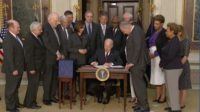President Trump has signed, somewhat reluctantly, a $1.3-trillion fiscal 2018 spending package that features a $21.2-billion increase for an array of federal infrastructure programs, including highways, airports, drinking-water and wastewater-treatment plants and veterans' health facilities.
The legislation, the product of bipartisan negotiations, cleared the House on March 22 by a 256-167 vote. The Senate followed suit in the early hours of March 23 by a 65-32 vote (View bill text here.). Trump signed the measure later that day.
In the morning, however, Trump had posted a tweet threatening to veto the spending package, for not providing as much funding for a border wall as he wanted and for omitting assistance to undocumented immigrants who came to the U.S. as children.
Enactment of the spending bill averted a partial government shutdown at midnight on March 23.
For the construction industry, the focus is on the omnibus measure's infrastructure dollars. The legislation draws on a recent bipartisan budget deal that included an additional $10 billion in fiscal 2018 for infrastructure, but left it up to appropriations committees to fill in the specifics.
Appropriators spread the $10 billion, plus another $11 billion, across a variety of infrastructure programs. (View fact sheet here.) Steve Hall, American Council of Engineering Companies vice president for government affairs, says, "We could make a strong case that across the board they could be 'plussed-up' much, much more, but it's a good first step."
Transportation accounts are major beneficiaries, receiving $8.7 billion in additional funds. Within transportation, highways leads the way, with a $3.5-billion increase from 2017 levels.
Of that total, about $1 billion would come from the Highway Trust Fund to meet the $44.2-billlion authorized level set in the 2015 Fixing America's Surface Transportation Act. The other $2.5 billion would come from the general fund, with most of those dollars to be divided among the states according to their shares of the overall highway obligations.
Joung Lee, American Association of State Highway and Transportation Officials policy director, says, "We would have liked to see more than the $2.5 billion going towards the federal-aid highway program, but obviously that is still very helpful."
Lee also notes that the final version didn't include an $800-million highway funding rescission that House appropriators had recommended.
The omnibus does increase highway dollars, but Lee says that "it doesn't get to the big-picture question...of the long-term solvency of the [Highway] Trust Fund, which admittedly requires a much, much bigger fix."
Dean Franks, American Road & Transportation Builders Association senior vice president for congressional relations, says the omnibus bill's additional $3.5 billion for highways is a increase of about 8%. He adds, "I think that sets a new baseline, moving forward, on where the investment should be at a minimum."
Other transportation gains include $1 billion for Federal Aviation Administration airport grants—by far the largest hike for that program in recent memory—and $1 billion for the routinely oversubscribed Transportation Investment Generating Economic Recovery (TIGER) grants.
Franks says ARTBA has been pushing for an increase in the airport grant program for more than a decade. He says, "Getting that billion dollars in there is going to be great," particularly for non-hub and rural airports.
Industry officials were disappointed, however, that the final package didn't include an increase in the maximum airport passenger facility charge, which is now $4.50. Those fees are another important revenue source for aviation infrastructure projects. Senate appropriators had recommended a PFC hike but it wasn't included in the final bill.
Environmental Protection Agency water infrastructure funding also would climb, with $300-million increases for both the wastewater-treatment and drinking-water state revolving funds, the National Association of Clean Water Agencies notes. NACWA says the $600-million "represents the most significant new money for these programs in many years."
Water-related groups also point to the separate $63-million allocation for the Water Infrastructure Finance and Innovation Act federal loan program, or WIFIA. Tracy Mehan, American Water Works Association executive director of government affairs, said in a statement, "There is a compelling need to replace and expand America’s water and wastewater infrastructure, and WIFIA is crucial to success in renewing these assets.”
The Army Corps of Engineers civil-works program would get a $789-million hike.
Dept. of Veterans Affairs health-care facilities would receive a massive $2-billion boost, including $1 billion for "non-recurring maintenance."
Moreover, some of the package's $61.1-billion increase in overall defense spending will go for military construction. According to a House Appropriations Committee fact sheet, the measure hikes "mil con" spending by $2.4 billion, or 31%, from the 2017 level.
The measure also allocates $1.6 billion for border infrastructure, including $1.3 billion for new or replacement fencing or barriers.
In addition, the legislation would extend authorizations for FAA programs, including airport grants, for six months. (See bill text, Division M.) The extension would carry through September. The current stopgap FAA bill is due to expire on March 28.
Story updated 3/23/18 to include bill's enactment, Trump veto threat, Senate passage and industry and state comments.




Post a comment to this article
Report Abusive Comment